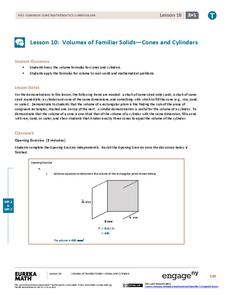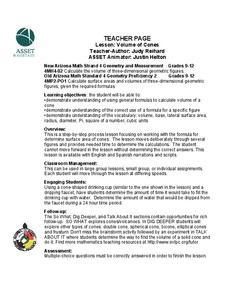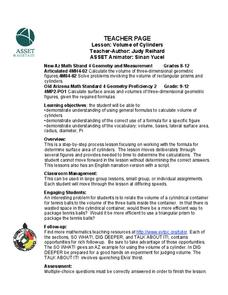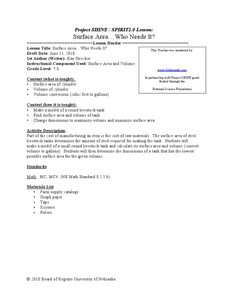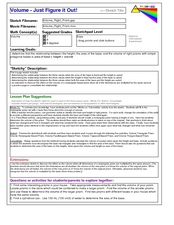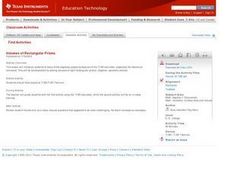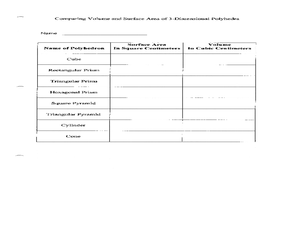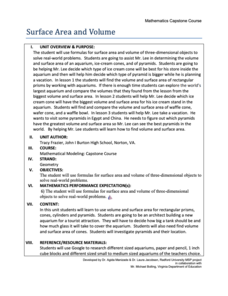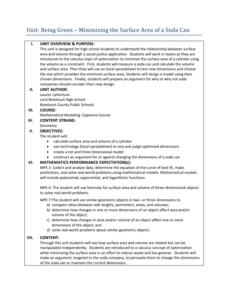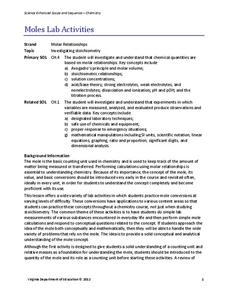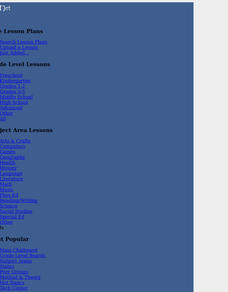Curated OER
Volume of Solid Figures
Learners calculate volume using the correct formula and the correct unit. They explore different prisms, spheres, cubes, and cones as they calculate volume and relate it to depths in oceans.
Teach Engineering
How Big? Necessary Area and Volume for Shelter
Teams must determine the size of cavern needed to house the citizens of Alabraska to protect them from the asteroid impact. Using scaling properties, teams first determining the number of people that could sleep in a classroom and then...
Shodor Education Foundation
Triangle Area
While the lesson focuses on right triangles, this activity offers a great way to practice the area of all triangles through an interactive webpage. The activity begins with the class taking a square paper and cutting in in half; can they...
Curated OER
Volume of a Cylinder
Middle and high schoolers calculate the volume of cylinders. They measure the height, radius and diameter of cylinders. Following given formulas, students calculate the area and volume of the cylinder. They compare cylinders and predict...
EngageNY
Volumes of Familiar Solids – Cones and Cylinders
Investigate the volume of cones and cylinders. Scholars develop formulas for the volume of cones and cylinders in the 10th lesson of the module. They then use their formulas to calculate volume.
Curated OER
Volume of Pyramids and Cones
High schoolers find the volume of pyramids and cones. In this volume of pyramids and cones lesson, learners explore the relationship between the volumes of prisms and pyramids. They investigate the relationship between pyramids and cones.
Curated OER
Volume of Cones
Young scholars identify the volume of cones and pyramids. In this geometry lesson, students derive the formula for cones and pyramids. They calculate the volume of cones and other three dimensional shapes.
Curated OER
Volume of Cylinders
Middle and high schoolers calculate the volume of cylinders. In this geometry lesson, learners differentiate between rectangular prisms and cylinders. They use the correct formula to solve for each solid.
Curated OER
Volume and Surface Area
Students explore volume and surface area. In this math lesson, students fill boxes with cubes to identify the volume of the boxes. Students discuss area.
Curated OER
Cylinder Volume Lesson Plan
Tenth graders define the formula for cylinders and use it to solve real world problems. In this geometry lesson, pupils differentiate between area, perimeters, 2D shapes, 3D shapes, and volume of prisms, cylinders and spheres. They...
University of Houston
Volume for Rectangular Prisms
Upper graders define perimeter and area of a rectangle, estimate numbers of cubes and determine the maximum amount that will fit in a given space. In this math lesson, pupils complete related worksheet, build prisms and find volume and...
Curated OER
Surface Area, Who Needs it?
In this geometry lesson on cylinders, geometers explore how to find the smallest surface area for a given volume. They use their knowledge to relate it to the real world by making a model of a livestock tank.
Curated OER
Volume of Prisms
Students calculate the volume of different polygons. In this geometry instructional activity, students identify the relationship between base and height. They calculate the area of each prism and cylinder.
Curated OER
Volume and Surface Area: Which Is More?
Students explore the volume and surface area of three dimensional figures. Through the use of video, students discover three dimensional shapes, their uses in real-life applications, and methods used to calculate their volume and surface...
Curated OER
Volumes of Rectangular Prisms
High schoolers determine the volume of a rectangular prism. They then maximize and minimize the volume given variable side lengths. Finally, they factor the volume equation to determine the side lengths.
Curated OER
Solid Surface Area
Students calculate the area of solids. In this geometry lesson, students use formulas to find the surface are and the volume of solids. They investigate 3-dimensional shapes.
Radford University
Surface Area and Volume
Who knew there were pyramids in China? Learners apply surface area and volume formulas to several different real-world situations. They calculate the volume and surface area of an aquarium, an ice cream cone, and Egyptian and Chinese...
Radford University
Being Green – Minimizing the Surface Area of a Soda Can
Save the world by designing a new soda can! Learners first measure the dimensions of a typical soda can and calculate its surface area and volume. They then use spreadsheet software to minimize the surface area for the volume, thus...
Curated OER
Moles Lab Activities
General chemistry class members engage in a mini-unit on mole conversions. Through nine lab activites with varying degrees of difficulty, they practice measuring mass and volume, molar calculations, and stoichiometry. Terrific...
Curated OER
Formulas for Volume and Surface Area
Students calculate the volume and surface area of each shape. In this geometry instructional activity, students use nets and other three dimensional polygons to create visuals of the volume of a shape. They define important...
Curated OER
Surface to Volume Ratios
High schoolers measure the rate of diffusion and to calculate the surface area to volume ratios of varying cell sizes. The lesson is very clearly organized with a useful student worksheet provided. They perform a lab experiment which is...
Curated OER
Stack It Up!
Students analyze and begin to design a pyramid. Working in engineering teams, they perform calculations to determine the area of the pyramid base, stone block volumes, and the number of blocks required for their pyramid base. They make a...
Curated OER
Inquiry Unit: Modeling Maximums and Minimums
Young mathematicians explore the maximun area for patio with the added complexity of finding the mimimum cost for construction. First, they maximize the area of a yard given a limited amount of fence and plot width v. area on a...
Curated OER
Filling The Urn
Learners calculate the area under a curve. In this calculus lesson plan,students calculate the area by integrating the equation. They calculate the volume of cylindrical shapes created between graphs.




